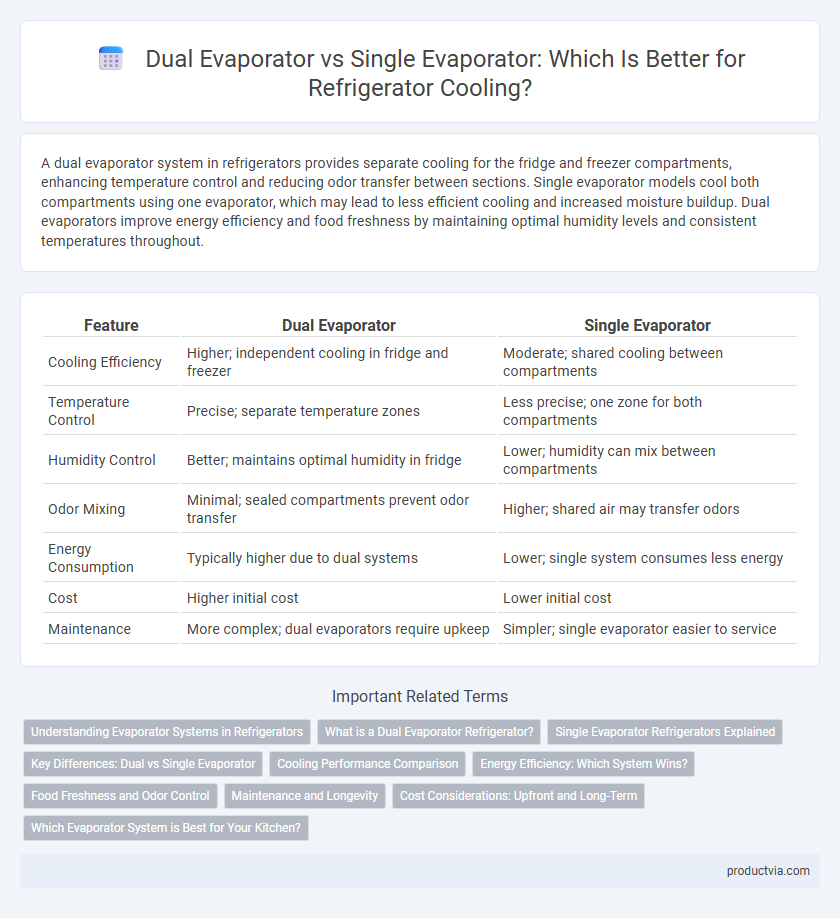A dual evaporator system in refrigerators provides separate cooling for the fridge and freezer compartments, enhancing temperature control and reducing odor transfer between sections. Single evaporator models cool both compartments using one evaporator, which may lead to less efficient cooling and increased moisture buildup. Dual evaporators improve energy efficiency and food freshness by maintaining optimal humidity levels and consistent temperatures throughout.
Table of Comparison
| Feature | Dual Evaporator | Single Evaporator |
|---|---|---|
| Cooling Efficiency | Higher; independent cooling in fridge and freezer | Moderate; shared cooling between compartments |
| Temperature Control | Precise; separate temperature zones | Less precise; one zone for both compartments |
| Humidity Control | Better; maintains optimal humidity in fridge | Lower; humidity can mix between compartments |
| Odor Mixing | Minimal; sealed compartments prevent odor transfer | Higher; shared air may transfer odors |
| Energy Consumption | Typically higher due to dual systems | Lower; single system consumes less energy |
| Cost | Higher initial cost | Lower initial cost |
| Maintenance | More complex; dual evaporators require upkeep | Simpler; single evaporator easier to service |
Understanding Evaporator Systems in Refrigerators
Dual evaporator systems in refrigerators use two separate evaporators to independently control the cooling in the fridge and freezer compartments, enhancing temperature accuracy and humidity control. Single evaporator refrigerators share one cooling source for both compartments, which can lead to temperature fluctuations and odor transfer between sections. Understanding these systems is crucial for selecting a refrigerator that maintains food freshness and energy efficiency.
What is a Dual Evaporator Refrigerator?
A dual evaporator refrigerator uses two separate evaporators for the fridge and freezer compartments, ensuring independent temperature and humidity control. This design prevents odor transfer and helps maintain optimal freshness for stored food by reducing cross-contamination. Compared to single evaporator models, dual evaporators offer enhanced cooling efficiency and better preservation of food quality.
Single Evaporator Refrigerators Explained
Single evaporator refrigerators use one cooling system that circulates air throughout both the fridge and freezer compartments, which can lead to uneven temperatures and moisture transfer between sections. This design often results in higher humidity levels in the fridge, causing food to spoil faster and frost buildup in the freezer. Single evaporator models are generally more affordable but lack the precise temperature control and energy efficiency found in dual evaporator refrigerators.
Key Differences: Dual vs Single Evaporator
Dual evaporator refrigerators feature separate cooling systems for the fridge and freezer compartments, allowing independent temperature and humidity control that enhances freshness and reduces odor transfer. Single evaporator models use one cooling system to circulate air through both compartments, which can lead to mixed odors and less precise temperature regulation. The dual evaporator design typically results in higher efficiency and better food preservation compared to single evaporator refrigerators.
Cooling Performance Comparison
Dual evaporator refrigerators provide superior cooling performance by independently controlling humidity levels in the fresh food and freezer compartments, preventing odor transfer and maintaining optimal temperature precision. Single evaporator models use one cooling system for both compartments, which may lead to uneven cooling and increased moisture buildup, compromising food freshness. The dual evaporator design ensures faster cooling recovery and better preservation of food quality compared to single evaporator refrigerators.
Energy Efficiency: Which System Wins?
Dual evaporator refrigerators offer superior energy efficiency by independently controlling humidity and temperature in the fresh food and freezer compartments, reducing compressor workload and minimizing energy consumption. Single evaporator systems rely on a single cooling source for both compartments, often leading to temperature fluctuations and increased energy usage to maintain optimal conditions. Energy Star ratings and studies consistently show dual evaporator models use 10-15% less energy compared to single evaporator refrigerators.
Food Freshness and Odor Control
Dual evaporator refrigerators maintain optimal food freshness by using separate cooling systems for the fridge and freezer compartments, preventing cold air crossover and moisture transfer. This technology significantly reduces odor mixing between compartments, preserving the original flavors and aromas of stored items. Single evaporator models use a shared cooling system, which can lead to odor transfer and fluctuating humidity levels that compromise food quality over time.
Maintenance and Longevity
Dual evaporator refrigerators typically offer better maintenance efficiency due to separate cooling systems for the fridge and freezer compartments, reducing frost buildup and easing defrost cycles. Single evaporator models may require more frequent maintenance to address combined compartment cooling issues, potentially shortening the appliance's lifespan. Investing in dual evaporators can enhance longevity by maintaining consistent temperatures and minimizing wear on cooling components.
Cost Considerations: Upfront and Long-Term
Dual evaporator refrigerators have a higher upfront cost due to advanced cooling components and separate compartments for optimized temperature control. Single evaporator models offer a lower initial price but may lead to higher long-term energy expenses because of less efficient cooling distribution. Evaluating energy consumption, maintenance, and repair costs is essential for determining overall ownership value between the two cooling systems.
Which Evaporator System is Best for Your Kitchen?
Dual evaporator refrigerators provide independent cooling for the fridge and freezer compartments, enhancing temperature control and reducing odor transfer, making them ideal for preserving diverse food types. Single evaporator systems rely on one cooling unit for both compartments, which may lead to fluctuating temperatures and potential moisture issues, but they are typically more energy-efficient and cost-effective. For a kitchen prioritizing precise freshness and food preservation, dual evaporators are best, while single evaporators suit budget-conscious users focused on basic refrigeration needs.
Dual Evaporator vs Single Evaporator for Refrigerator Cooling Infographic

 productvia.com
productvia.com